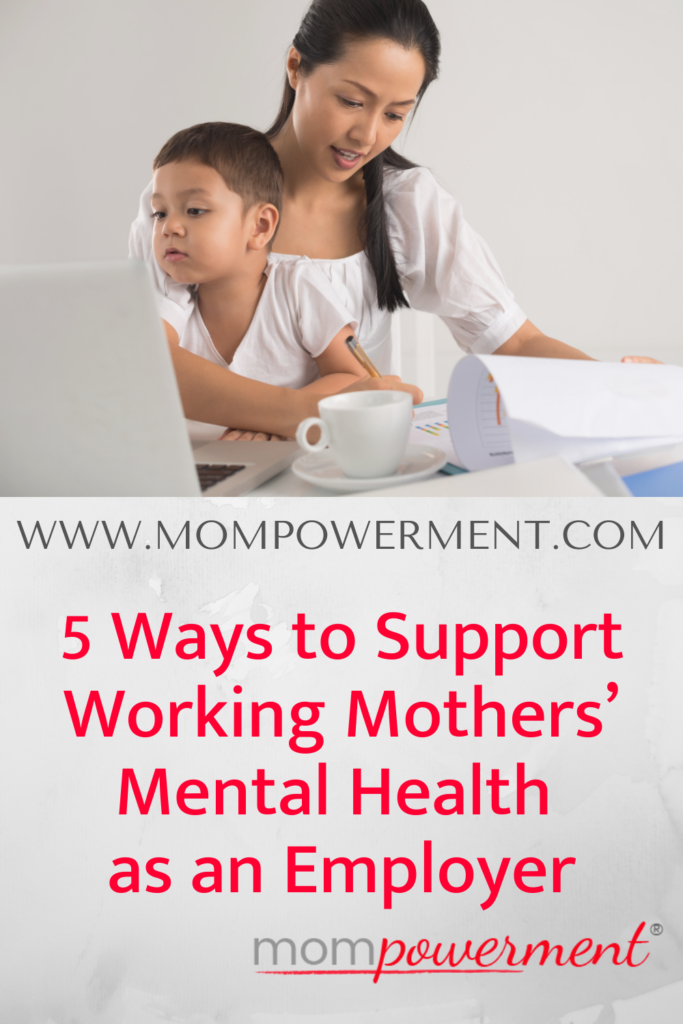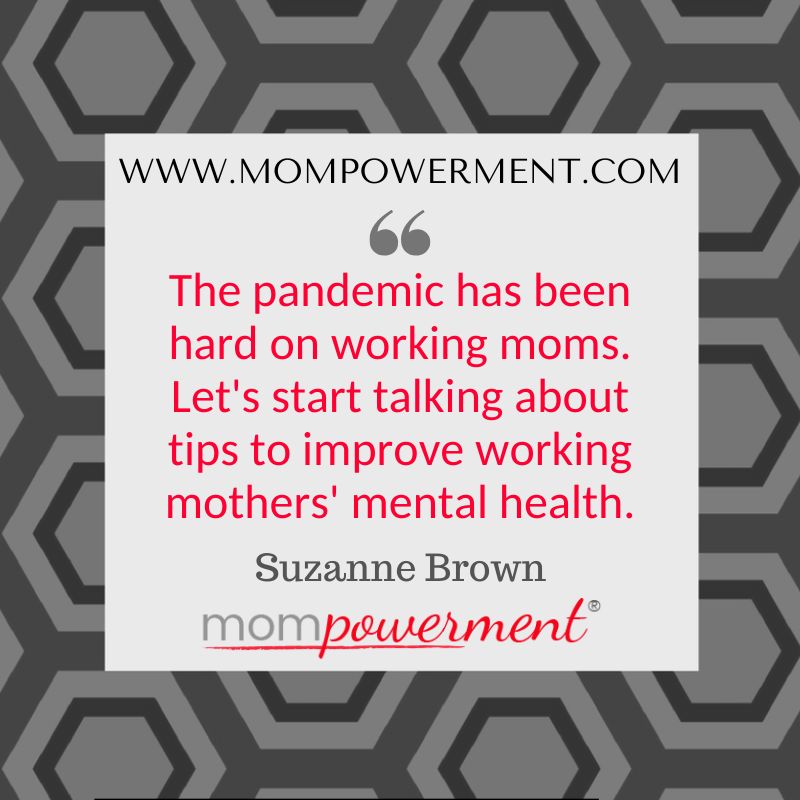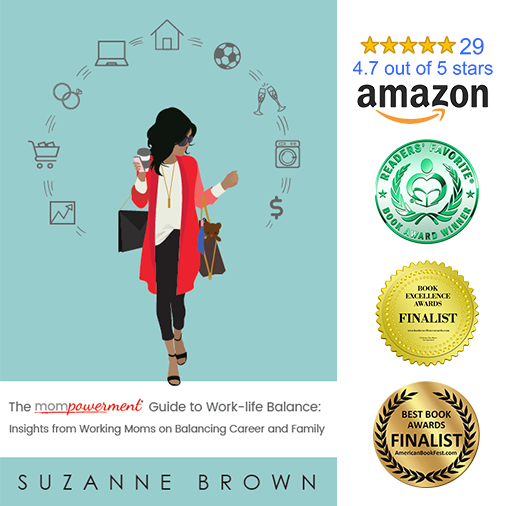
You probably know that the pandemic has been hard on working mothers. After all, 1.4 million of them left the workforce during the pandemic.1 Many haven’t returned. Working moms are struggling with their mental health. I’m sharing 5 ways to support working mothers’ mental health as an employer.
(While this advice is written for managers working with working moms (and dads), many of these can be used for all employees. You might need to tweak it a bit, but it’s still applicable to your bigger pool of employees.)
Why does this matter to you as an employer?
If you’re struggling with attracting and retaining talent, you’re seeing the effect of the challenges that working mothers have faced and continue to struggle with. I heard someone mention on a podcast that we survived the pandemic because of working mothers, because of the extra work they took on (I wish I could find that podcast again!!). About 75 percent of those surveyed talked about taking on 1+ hours per day additionally, 40 percent of them took on 15+ hours per week of work at home (childcare and household duties).2
I have said before that you can’t stop being a mom or a daughter (in case this working mom is being sandwiched as she cares for aging parents and children), but she can stop being an employee (or business owner). When things get so bad, you quit your job.
In addition to attracting and retaining talent, you want your employees to be at their best. You want them to be productive, focused, and engaged. Working moms account for about one-sixth of your employees and they take on a lot of the stuff that keeps your team working like a well-oiled machine. Consider the importance of working moms (and dads) who might be leaving as part of what is now called the Great Resignation (really, it’s a Great Realignment). They are often made up of important contributors or mid-level managers.3 This level is the backbone of making things happen now and the potential leadership of tomorrow. They matter. A lot.
And, finally, let’s be honest. Helping the working mothers who are your employees is the right thing to do. We’re talking about a third of the women in your organization. You want to ensure they are at their best. They are your employees, managers, leaders, colleagues, and friends. Their influence goes beyond your company and clients. Working mothers impact the leaders of tomorrow.
Managers and leaders must model behavior
“Managers are on the front lines of employees’ day-to-day experiences, which means their actions have a significant impact on employee burnout and well-being. To improve outcomes, managers should focus their attention in three key areas: modeling work-life boundaries, supporting employee well-being, and ensuring that performance is evaluated based on results.”4
Show your employees how you embrace work-life balance. Say aloud to your team that you’re heading out to pick up kids from school or attend a child’s event. Let your team know that vacation is to recharge and enjoy your time away (without work). And don’t engage your employees when they’re away (unless it’s absolutely necessary and then still try to problem solve without them).
Train managers
It’s not as simple as asking “How are you?” and employees respond with a thoughtful and honest answer. Provide training for your managers and HR professionals so they know how to ask integral questions that get real answers. You might need to hire an outside resource who specializes in mental health to provide some training or you might have employees on hand who specialize in asking key questions (e.g., your existing insights team might be able to do this).
Ask employees what they need. Don’t be OK with “I’m fine” when something seems off. Listen for cues. Follow up when you hear something seems off. If someone says all is OK, but you hear them talk about not sleeping because the baby is teething, that is a great moment to ask a question. Maybe it’s something like “Would it be helpful to start a bit later?” while your child is teething or “Do you need a bit more time in the morning while your spouse is traveling this week?” Use active listening and follow-up questions.
Provide flexibility in its full form
It’s not only about working from home, even if that’s permanently your work model. Working remotely is only the iceberg. There are more structured forms of flexibility such as working from home or part-time roles.
And then there is the more informal piece where you allow people to work when and how will make them most successful. You hired them because of a particular set of skills to get a job done. Trust them to do their job. At its most basic level, give employees the ability to work when they need to throughout the day, starting earlier or ending later, without the need to negotiate this. If someone needs to end their day early, they will make up the time. Don’t require a major negotiation effort with their manager for this to happen.

Provide access to mental health providers as a benefit
Health insurance doesn’t always cover access to mental health providers. If your plan doesn’t, consider this as a separate benefit. Enable your working moms (and dads) to talk to mental health professionals to get the help they need. Engage telehealth services, which is now a very normal way to engage with mental health providers. While you’re at it, consider providing access to mental health services for the whole family. Kids are also struggling.5 When your kids are struggling with mental health, it might be hard to focus on other things.
Maximize meeting time
I would be remiss to discuss 5 ways to support working mothers’ mental health as an employer without including something regarding maximizing meetings. Many (maybe even most) employees spend a lot of time in meetings. If your employees are in meetings all day, they will have to work during non-work hours. Help your teams know why to hold a meeting and how to be the most efficient and effective before, during, and after the meeting. Yes, it’s something you can coach your teams on. Be an example of this as a great starting point (remember, modeling behavior is important). After all, it’s normal to learn from your manager.
A reminder to managers, HR professionals, and senior leaders…Please remember to give space and grace. Working moms and dads need the space to change and the grace to make changes. It’s not all going to work perfectly. There will be days where things go well and moments, days, and weeks (maybe even months) where things aren’t quite working the way you’d hope. It’s all OK. Keep supporting your working moms and dads as they make the effort to change.
Now you’ve got 5 ways to support working mothers’ mental health as an employer. Consider bookmarking this article to refer back to when you need it. I want to hear from you, though. How are you supporting your employees’ mental health? On the flip side, where are you struggling as you try to provide this support? What do you want to know more about?
Want more ideas on how to support working mothers and fathers in your organization? Download the Mompowerment white paper on how to Become a More Balance-friendly Company for Working Mothers.
Disclaimer
This article is based on updated content from experts and renowned resources available on the internet as well as interviews with 110+ working mothers that were done as research for the Mompowerment books. This content is not designed to be a substitute for direct medical advice from a qualified medical professional. If you have employees who are dealing with overwhelming chronic stress, anxiety, or other mental health challenges, please help them reach out to a medical professional.
1 https://www.census.gov/library/stories/2021/03/moms-work-and-the-pandemic.html
4 https://www.mckinsey.com/featured-insights/diversity-and-inclusion/women-in-the-workplace
5 https://health.clevelandclinic.org/how-the-pandemic-has-affected-children/


